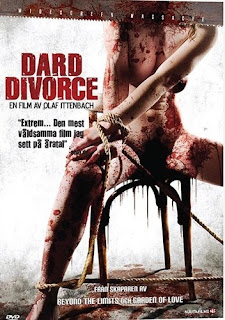While provocation in film is always
welcome, especially in these times of moral posturing and virtue
signaling, making an “extreme” film can sometimes be a tightrope
to walk in that the idea of being “shocking” for the sake of it
can wear thin pretty fast. Looking back however at the proliferation
of films that got branded with the “extreme” tag that sprung up
in the late 90's and early to mid-2000's, a good number of them stand
the test of time, no doubt on account of being made by filmmakers
with more on there mind that mere shock value. Japan was particularly
adept in this field, with Takashi Miike taking on-screen gore and twisted sexuality to new
levels in Ichi the Killer (2001) and Visitor Q
(2001) and Takashi Ishii pushing Japanese censorship to its limits
with Flower and Snake (2004). South Korea's Kim Ki-duk also had
audiences gasping thanks to films like The Isle (2000) and Bad Guy
(2001). There was also of course the New French Extremity, the
pinnacle being Gaspar Noe's Irreversible (2002) which turned the
rape-revenge formula on its head by telling the story backwards.
Being one of the forefathers of German splatter, Olaf Ittenbach was
an extreme filmmaker from the beginning so it's hardly a shock that
2007's Dard Divorce, an exceptionally nasty piece of business, would
out-due the rest of the extreme horror competition at the time.
In the midst of a nasty separation from
her husband Tim, Nathalie Stein (Martina Ittenbach) is shocked when
Tim appears on her front porch appearing to be gravely injured, only
to die right in front of her. When Nathalie returns after calling the
police however, Tim's body is nowhere to be found. Soon after
Nathalie begins to learn some hidden truths about her husband and his
involvement with several shady individuals when she is visited by two
strangers each telling their own version of what really happened with
Tim and a substantial amount of cash. With both believing Nathalie to
be hiding information from them regarding Tim, Nathalie finds herself
fighting for survival with both attempting to retrieve answers from
her utilizing increasingly excruciating methods.
Sadistic even by Ittenbach standards,
Dard Divorce (“Dard” being a Persian word for “pain” which is
made a plot-point) has the misfortune of being branded with the
lamentable label “torture porn” by dismissive reviewers, a
massive short-selling of the film. While it's true that Nathalie's
tormentors do utilize torturous tactics, the actual scenes of torture
aren't what hold the film together. The core of the film is the
mystery surrounding Tim's disappearance, if he's actually dead or not
and what exactly did he do to cause Nathalie to endure all she does
throughout the film. Making things more interesting is the Rashomon
(1950) style in which the story is told, with each of Nathalie's
torturers telling their own version of the story, each of course
being completely different. Although Tim and Nathalie's actual
divorce never becomes that big of a narrative concern, Ittenbach
nevertheless finds time to address it, even making Nathalie a bit of
an alcoholic. Having children getting mixed up in both the divorce as
well as the ensuing violence also add a bit more drama to the
divorce angle, making Nathlie's struggle all the more harrowing with
Martina Ittenbach really being put through hell. Dard Divorce may
also have the distinction of being Ittenbach's most viscerally violent film with
Ittenbach crafting some of his most grotesque moments including an
over-the-top kitchen massacre and a jaw-droppingly innovative death
scene on par with the decent into Hell in The Burning Moon (1992) and
the SWAT team assault in Garden of Love (2003).
Unfortunately, the film does suffer
from a glaring technical flaw late in the film when the details of
the central mystery are revealed, the music becomes so loud 99.9% of
the dialogue is nearly unintelligible. It doesn't seem to be an issue
affecting select copies of the film either as nearly every review
available of the film makes note of it. Not that it leaves things
open ended, the montage played during the scene makes everything
perfectly clear, but to say its distracting would be an
understatement. It doesn't seem like Ittenbach has addressed the issue
anywhere either, though again the film was very much a bare-bones
type of production with Ittenbach shooting a good chuck of the film
in his own home in Germany but also later traveling to the US to
shoot additional footage, explaining the sometimes awkward clashing
of German and American accents. This back-to-basics type of working
does give the film a much more grittier feel than some of Ittenbach's
previous works like Beyond the Limits (2003) and the previously
mentioned Garden of Love, making the film feel more in line with
Ittenbach's earlier works like Black Past (1989) and The Burning
Moon. Dard Divorce is certainly an acquired taste in an already niche
subgenre, but when taking into consideration the horror zeitgeist of
the time, it's a prime example of a master demonstrating how to
really get extreme.


No comments:
Post a Comment